

Sub Club by RevenueCat
David Barnard, Jacob Eiting
Interviews with the experts behind the biggest apps in the App Store. Hosts David Barnard and Jacob Eiting dive deep to unlock insights, strategies, and stories that you can use to carve out your slice of the 'trillion-dollar App Store opportunity'.
Episodes
Mentioned books
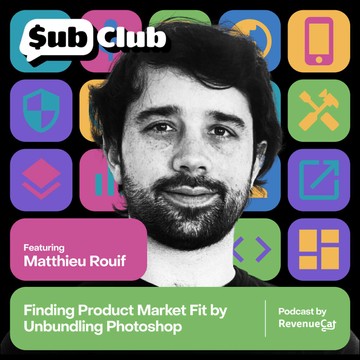
Sep 15, 2021 • 45min
Finding Product Market Fit by Unbundling Photoshop — Matthieu Rouif, PhotoRoom
Watch the video version of this show on YouTube »Matthieu Rouif is the co-founder and CEO of PhotoRoom. PhotoRoom enables anyone to create studio-quality photos on their iPhone. Before founding PhotoRoom, Matthieu was the Senior Project Manager at GoPro. Matthieu is also the co-founder and CTO of HeyCrowd, and co-founder and CEO of As-App.Matthieu earned his graduate degree in materials science and engineering from Stanford University, and his bachelor’s degrees in economics, and physics from École Polytechnique. While at École Polytechnique, Matthieu was a member of the skydiving team and debate team. Matthieu also served as a Parachutist Commando Officer in the French Air Force.Matthieu started developing apps in 2009 as a student at Stanford, and subsequently started two iPhone app companies. He was part of the Replay app team when they won App of the Year in 2014. Matthieu started PhotoRoom after leaving GoPro in 2018.In this episode, you’ll learn:Matthieu’s retention strategies for keeping app users subscribedInnovative and clever ways to get users to demo your appBalancing your app’s pricing and featuresHow churn can be an assetLinks & ResourcesYCHeyCrowdGoProPhotoshopZenleaShopifyPoshmarkDepopCorelMatthieu Rouif’s LinksMatthieu on TwitterMatthieu on LinkendInPhotoRoom is hiring!10 Tools to Ship an iOS App in 2 WeeksPhotoRoom’s WebsitePhotoRoom APIPhotoRoom on TwitterFollow us on Twitter:David BarnardJacob EitingRevenueCatSub ClubEpisode Transcript00:00:00 David:Hello, I’m your host, David Barnard. And with me as always, Jacob Eiting, RevenueCat CEO. Our guest today is Matt Rouif, co-founder and CEO at PhotoRoom, the app for removing backgrounds and creating studio quality photos right from your phone.On the podcast, we talk with Matt about how his time at GoPro led to founding PhotoRoom, how churn can actually be an asset, and how being locked in Apple’s basement led to one of PhotoRoom’s biggest marketing wins.Hey, Matt. Thanks for joining us on the podcast today. How are you doing?00:00:48 Matthieu:Great. Hey David, Hey Jacob.00:00:51 Jacob:Hi, it’s nice to finally meet internet/virtual face-to-face. We’ve known each other for a little while. I’ve become fortunate to know you kind of through RevenueCat, but not actually know-know you. So, it’s nice to finally put a face to the name.I was looking back through my email and I think the first I ever heard of you was from our mutual friend, Cisco, if I say that correctly?00:01:23 Matthieu:Yeah, Francisco.00:01:24 Jacob:Francisco, who shared with me a blog post that I had seen that you wrote where you talked about RevenueCat as part of your stack. Since then, I think we talked as you were thinking about going into YC, and then after YC, I put in a little bit of money, so this is a good opportunity to check in on my investment.I’m super excited to dive in, because there’s a lot of questions. I kind of have followed you guys and kind of seeing some of the stuff you’ve been doing, but I don’t know, like the behind the scenes decision making processes and like, and all that stuff. So yeah, I’m excited to hear the story firsthand.00:02:04 David:Yeah, but before we get into PhotoRoom, you’ve got quite a history in app development. So, I want to go back to the beginning and talk war stories. A lot of people were in the industry way back when. Jacob and I both started really early as well. So, you got your start during the Stanford class and you were actually a teaching assistant at Stanford at the time, right? I’m kind of stealing your story, but yeah. Tell me, tell me how you got into it.00:02:34 Matthieu:Yeah. Actually I wasn’t a teaching assistant in physics. I was doing a master’s in physics at Stanford, right at the moment of the first iPhone class. And, I actually went to Stanford because I was fascinated by the entrepreneurship. And I had this business idea of printing photos and sending them.And that seemed a lot easier not to buy hardware, but just use the iPhone which just started at that point. So, I was at Stanford, there was the iPhone class. I wanted to do a photo app. So, see, 12 years later....00:03:05 Jacob:A 12 year overnight success.00:03:07 Matthieu:That’s what they say. Exactly. And, yeah, I got, I actually, I got started, programming.I was doing physics before, and I didn’t know anything about programming. So I took a class with a friend that went through the basics, and I just wanted to push products on apps. And I found that the iPhone was the best at that point. And actually the photo app became something else.The first company I started back in grad school and they became like a ski resorts app. I shipped, we had all of the major ski resorts. And, It was a great, I did that for two years and a major ski resorts and, yeah.I started an apps company after that, one called HeyCrowd around a social network. So like we had surveys that you could answer to with polls, like, a bit like Instagram stories now, and that didn’t work so well compared to the ski resort, but, yeah, I got into iPhone apps right since the beginning.00:04:18 Jacob:I remember the Stanford course. It was on iTunes U that was mass disseminated or was it the later one?00:04:25 Matthieu:No, it was the one that it wasn’t Stanford U. There was a, the guy from Fitboard during the class. I don’t know if it was doing that.00:04:42 Jacob:Yeah. I remember. I remember it being like the moment when we were like, oh, this is going to go mainstream. Right? Like, because up to that point, you had to learn iOS by doing basically Mac OS. That was like the one point there was the big nerd book you learned Mac OS, and then the SDKs came and you like tried to learn quickly, like what worked and what didn’t.But, if you were like me who came from no Mac programming, there was really no iPhone entry into it. I remember when the Stanford...
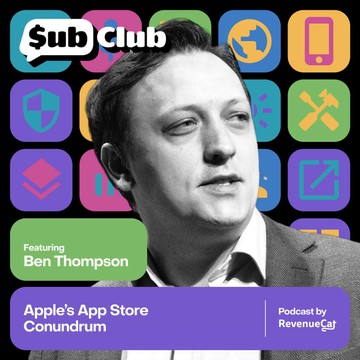
Sep 7, 2021 • 1h 27min
Apple’s App Store Conundrum — Ben Thompson, Stratechery
On the podcast, we talk with Ben about all things app stores. From Apple’s revolutionary launch of the App Store in 2008 to the monopoly-like powers both Google and Apple now wield today. With multiple lawsuits filed, government investigations ongoing, and developer sentiment at an all-time low, we take an honest look at the challenges and trade-offs in trying to bring two of the world’s largest companies to heel.Ben Thompson's LinksStratecheryBen’s Twitter: @benthompsonFollow Us:David Barnard: https://twitter.com/drbarnardJacob Eiting: https://twitter.com/jeitingRevenueCat: https://twitter.com/RevenueCatSub Club: https://twitter.com/SubClubHQ
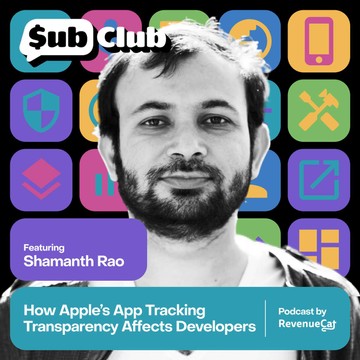
Aug 25, 2021 • 48min
How Apple’s App Tracking Transparency Affects Developers — Shamanth Rao, RocketShip HQ
Watch the video version of this show on YouTube »Shamanth Rao is the founder and CEO at Rocketship HQ. Shamanth also hosts the Mobile User Acquisition Show podcast, and is the lead instructor for the Mobile Growth Lab workshop series.RocketShip HQ is a boutique growth marketing firm with 8 figures in managed spend. Before founding RocketshipHQ, Shamanth led growth marketing resulting in 3 exits: Bash Gaming (sold for $170mm), Puzzle Social (acquired by Zynga), and FreshPlanet (acquired by Gameloft). Shamanth has also helped many other mobile apps grow and scale.Shamanth is passionate about teaching and sharing everything he’s learned about mobile growth. Much of his time and energy goes into the Mobile User Acquisition Show. Shamanth strives to ensure that the wisdom he’s gained reaches as many people as possible.In this episode, you’ll learn:The history of user acquisition and algorithmic targetingHow Apple’s AppTrackingTransparency has shifted users to AndroidWhat Apple’s new tracking policy means for developersAre subscription apps impacted more than other apps by Apple’s tracking policy?Links & ResourcesA Brief History of App Store Monetization episode – with David BarnardA Brief History of Device Identification episode – with David PhilippsoniOS 14 & IDFA Deprecation How App Marketers Must Adapt - YouTubeShamanth Rao’s LinksRocketShip HQ’s websiteThe Mobile User Acquisition ShowMobile Growth LabFollow Shamanth on TwitterShamanth Rao’s websiteFollow us on Twitter:David BarnardJacob EitingRevenueCatSub ClubEpisode TranscriptShamanth: 00:00:00The more signal you give to the algorithm, the better the algorithm performs, right? You know, in the post AppTrackingTransparency world, if you gain more purchases, the better the algorithm performs, obviously that would take purchases from you and everybody in the world, and it would just do better. Now, obviously it’s just taking your trial and doing much, much better.David: 00:00:38Welcome to the sub club podcast. I’m your host, David Bernard, and with me as always Jacob Eiting.Hello Jacob.Jacob: 00:00:45David, glad to be here with you, as always. David: 00:00:48Our guest today is Shamanth Rao, founder and CEO at RocketShip HQ, of the podcast Mobile User Acquisition Show, and lead instructor at the workshop series Mobile Growth. Shamanth’s company, RocketShip HQ is a boutique growth marketing agency with eight figures in managed spend. Prior to founding RocketShip HQ Shamanth growth marketing, to three exits. Hey Shamanth.Welcome to the podcast. Shamanth: 00:01:16Honored to be here. Thank you for having me, David and Jacob.David: 00:01:19Yeah. So, I wanted to start with a little bit of a history lesson. You’ve been in mobile advertising and working on mobile apps for, since very early. So, could you take just a couple of minutes and step us through the history of kind of what led us to today with app tracking transparency, and all the different ups and downs and changes that have happened over the past?Shamanth: 00:01:48Yeah. There’s been a lot of ups and downs, as you said. I see two overarching trends, but for folks who want to go into the weeds, I would actually recommend two podcast episodes. One was mine with you, David. A brief history of App Store monetization. You provide a very great perspective into how the App Store itself has changed over the years.The other one was an interview I did with David Phillips, A Brief History of Device Identification You know, we are all about brief histories, but, I think to what we talking about ATT and how essentially disrupted growth in today. There have been two forces that have led up to this point, the last decade or so I think it’s important to know and understand both of these, just to know how we got here and why it’s important, right.Because ATT just did not happen overnight. There were signs for a decade. And, you know, I think obviously a lot of this is evident in retrospect. but I think it’s helpful to know and understand what those breadcrumbs were.Trend number one has been increasing accumulation of particular data platforms over the last decade.You know, I remember, you know, David, as you pointed out, I am a really old person who, which around then, but we don’t advertise. It took off, with all this gray hair. But you know, when I started that we were doing CPC buys, CPM buys. I started doing mobile advertising before Facebook even had mobile ads, app ads.There is no conversion tracking. you know, I give it like no conversion tracking. If you, would buy installs, and you’re like, oh, we bought 70 stops. We got so many touches that we are profitable and spent like millions on games the time. And suddenly the level of sophistication that emerged in mobile advertising. I don’t think we could have posted in 12, 20 13, 20 14. But like I said, from the TPC buys gradually they have a CPI buys as ad networks that now are billion dollar companies. And so it’s an app love and have a tiny ad networks at the time.A lot of others basically fell out of the side. know, they, they like, we have enough confidence to be able to build. Rather than just a or impression we have that kind of data, that kind of confidence the next time AEO or purchase optimization. This is 2016, right?It’s just, it seems so recent. And it’s staggering to think that they could not optimize like athletes if they six, years ago. And that was just the biggest game changer in it. I still remember having a lot of skepticism that this would even work and I’m like, how are they going to find out who’s going to purchase?They’ve never done it, nobody’s done it. But clearly, if somebody could do it as a Facebook, they had the budget for data. I can only to that point the time I think it became evident to me, myself, that as to why Facebook was so successful. basically have the IDFA that IDFA on Google ID.They had that idea, with print from on Facebook audience network. So for diva able to predict with ed accuracy, who the purchaser’s book, obviously they took it a step further with relapse optimization, So obviously the more data Facebook’s SDK gun. The better it got predicting who the purchaser as well.Obviously more data the pixels on the web got the better, the...
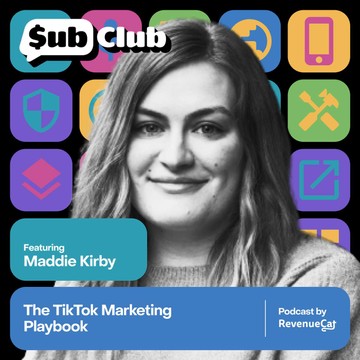
Aug 11, 2021 • 53min
The TikTok Marketing Playbook — Maddie Kirby, 1 Second Everyday
Watch the video version of this show on YouTube »Maddie Kirby is currently the Senior Social Media Manager for the video journal app, 1 Second Everyday. Maddie started her social media marketing career at Ozwest. Ozwest is an exclusive distributor of Zing branded toy products and the Ozwest toy line in the USA and Canada.While working at Ozwest, Maddie started growing her personal social media presence. Maddie has almost 400k followers on TikTok. Since joining 1 Second Everyday in 2019, Maddie has been instrumental in leveraging TikTok to organically drive millions of downloads.Maddie has a bachelor’s degree in advertising from the University of Oregon, and has also worked for companies such as Bytedance, Inc., Egg Strategy, Transition Productions, and Atomicus Films.In this episode, you’ll learn:How to promote your app with user-created contentClever tricks to get your app noticedWhy TikTok is a great place to market your appA great strategy for growing your app’s follower countLinks & ResourcesMaddie and David’s App Promotion Summit USA panel discussionCesar Kuriyama’s TwitterCesar Kuriyama’s TED TalkDavid Smith on The Sub Club PodcastWidgetsmith appMaddie Kirby’s LinksMaddie Kirby’s TikTokMaddie Kirby’s LinkedIn1 Second Everyday’s website1 Second Everyday is on Twitter1 Second Everyday’s InstagramZing Toys websiteFollow us on Twitter:David BarnardJacob EitingRevenueCatSub ClubEpisode TranscriptMadison: 00:00:00I like to think of them as content buckets or pillars. You pick three and stick with those for a little bit. Try a few ideas in each bucket. See what's working, what's not. Scrolling through the app is the best way to kind of keep on top of things. And then you have to be able to think really fast and post really fast because these trends come and go. Jacob: 00:00:39Welcome to the Sub Club podcast. Our guest today is Maddie Kirby, Senior Social Media Manager at 1 Second Everyday. She began her career in social media marketing at toy company, Ozwest.While working there she also started growing her personal social media presence, accumulating almost 400,000 followers on TikTok.In 2019, Maddie joined 1 Second Everyday where she has been instrumental in leveraging TikTok to organically drive millions of downloads.Maddie, welcome to the podcast.Madison: 00:01:08Thank you. I'm excited to be here.Jacob: 00:01:10I'm also here with David, my guest, which I forgot to introduce in our freaky Friday intro swap.David: 00:01:16I usually do the introductions, but that was great. Jacob.Jacob: 00:01:19Hey, you know what? I'm very, very, very versed at...David: 00:01:21You gotta mix things up. Jacob: 00:01:23I'll pass back to David because he's the one who preps all the questions. David: 00:01:29Nice. Maddie and I were on a panel together earlier this month, at App Promotion Summit, which is a great thing to watch. We can link it in the show notes.It was four of us on the panel and it went really quick, but she shared a lot of really interesting stuff about what she's working on in social media marketing, and working with 1 Second Everyday on their TikTok presence.So, I wanted to bring her on the podcast to actually give her time to talk a little more about it in the context of promoting apps, because she's been on a couple of other podcasts where they're talking more specifically about social media.I'm super excited to have you, Maddie.I do want to dive in. We typically do have more developer focused guests, you know, people that are doing the coding or focused on user acquisition, spending 50K a month on Facebook. And so that's another reason I was excited to have you on the podcast is to just get a really different perspective.I think that there's a lot of potential in social media marketing. But not a lot of people talking about it in the app space and then...Jacob: 00:02:40Or just knowing how to do it, right?How do you even start, especially if you're a developer-turned-promoter. I think a lot of app creators tend to do the things you were talking about. David does technical channels about buying ads on Facebook or whatever, where's a lot of leverage in social media stuff. If you can do it. David: 00:03:02Yeah, absolutely. So, I did want to start with, you got your start in social media marketing, not with an app, which is another thing. It's like you came to the app marketing with such a different perspective, which I think is is really good. There's too many people who are just so narrowly focused in the kind of existing playbook for marketing apps.So, are there any lessons from your time at of all the places a toy company? Any particular lessons from being at a toy company that you think helped you grow and learn this form of marketing and specifically that apply to subscription apps?Madison: 00:03:41Yeah. I don't know if it's necessarily a lesson or lessons that I've learned. But I think coming from the toy industry, which is also an industry where people don't leave it. They have a lot of people that started in the industry and then just stayed there forever. You have a lot of people that aren't really thinking beyond just what they are normally, what they're used to, I guess, is what I would say. Jacob: 00:04:05Is what they're used to, like ads on Nickelodeon.Madison: 00:04:08Yeah, it's definitely commercials. Like when they were still talking about TV and trying to transition out of that, that's really funny that you brought that up, but that's kind of what we were talking about at the time. So I got really lucky and I had a great manager who really wanted me to push people outside of their boxes.And I feel like I wouldn't have found TikTok unless I was at a toy company, because we were so focused on trying to connect to Gen Z and young people. And I heard some kids talking on our public transportation abo...
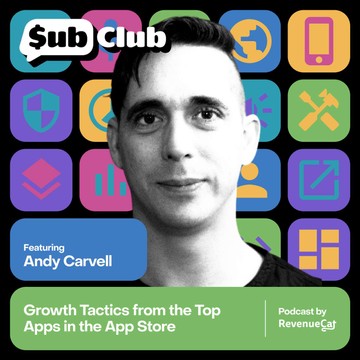
Jul 28, 2021 • 45min
Growth Tactics from the Top Apps in the App Store — Andy Carvell, Phiture
Watch the video version of this show on YouTube »Andy Carvell is the Partner & Co-Founder of Phiture, a mobile growth agency. Here he has worked with some of the biggest apps on the App Store, including Headspace, Spotify, Triller, and VSCO.Prior to founding Phiture, Andy worked on the marketing and growth teams at SoundCloud. His team built SoundCloud's activity notification system, which delivered over 500 million pushes per month, and increased M1 retention by five percentage points in its first few months of operation. Andy has been in the mobile industry since the late ‘90s, when he started working at Nokia. Andy has a deep interest in technology, strategy and the execution of ideas.In this episode, you’ll learn:Andy’s user retention techniquesThe most overlooked component in marketing your appHow to optimize your customer’s App Store experienceAndy’s formula for maximizing your app’s notification strategyLinks & ResourcesSoundCloudHeadspaceSpotifyTrillerVSCONokiaRevenueCatSalesforceIntercomElevateKiwiCoBrazeLeanplumIterableAndy Carvell’s LinksPhiturePhiture’s Mobile Growth StackAndy on Twitter: @andy_carvellAndy on LinkedInWork at PhitureFollow us on Twitter:David BarnardJacob EitingRevenueCatSub ClubEpisode TranscriptAndy: 00:00:00So the impact that you can drive with notifications is reach, times relevance, times frequency. What we learned from the time at SoundCloud was not all notifications are equal, and the really killer ones that are going to really supercharge your business, have high reach, high relevance and high frequency.And then, then you’re in that golden quadrant.David: 00:00:35Welcome to the Sub Club podcast. I’m your host, David Bernard. And with me is always Jacob Eiting. Hello, Jacob.Jacob: 00:00:42Hi, David. David: 00:00:43It’s a thundering in your neck of the woods, I hear. Jacob: 00:00:46It’s, you know, it’s cleared up now. I think we’re gonna make it.David: 00:00:50I’ve got a plumber. Our guests might have some construction workers. It’s going to be a fun one today!Jacob: 00:00:55Is it, David? You’re breaching the magic of podcasting and it’s going to get audited out.David: 00:01:01All right. Speaking of our guests, our guest today is Andy Carvell, partner and co-founder of Phiture, a mobile growth agency. At Phiture, Andy has worked with some of the biggest apps on the App Store, including Headspace, Spotify, Triller, and VSCO.Prior to find founding Phiture, Andy worked on the marketing and growth teams at SoundCloud.Welcome to the podcast, Andy.Andy: 00:01:23Thanks, David. A real pleasure. Thanks for inviting me on. Excited to be here.David: 00:01:27Yeah. So, you and I were chatting a little bit about your background as I was kind of prepping your bio, and you shared a really fun anecdote. So, I think I’m like, “Old man in the mobile space,” you know, or Jacob and I both; we both had apps on the App Store in 2008, you know, we were early. But you started in mobile a little, just a few years before that. Andy: 00:01:52Just a little bit more. David: 00:01:53Tell us about that. You were at Nokia making games in 1999.Andy: 00:01:58Yeah, right out of university, I graduated computer science in ‘99. I always wanted to be making games, and I was applying for roles in the games industry, and then the agent that was kind of helping me find those said, “Hey, there’s this company Nokia. They make mobile phones.”I didn’t own a mobile phone at that point. None of my friends did, but it was just kind of reaching the tipping point, and they wanted to put games on these things, and I’m like, okay, that’s sounds interesting.I went along to the interview. I really was very kind of amazed at the, you know, the R and D center there. It was like, like pretty space age, you know, they were working on some real next level shit.And, I was actually pretty excited by the idea of like cramming, you know, decent games into like 16 kilobytes, which is what I had to play with building embedded games on a black and white 84 by 48 pixel display.Jacob: 00:02:55So, I was going to ask, are we talking like Snake, or are we talking like Java level stuff?Andy: 00:03:00It was pre Java. It was an embedded game. So, I was coding in C in Assembly, and I basically had to like build the whole game from start to finish. We had this shared designer who did the pixel art, and I had to cram it into 16K and make it fun. Yeah.I wrote a pretty game called Space Impact there, which was released on the 3310 phone, which I think wasn’t available in America. But in the rest of world a lot of people played that game. It was like the first, side-scrolling arcade, shoot-them-up, on a mobile.David: 00:03:30That is amazing. Jacob: 00:03:31Well, it’s pretty incredible. Just even think like the iPhone wasn’t that far behind that right? Like you were doing 16K assembly and C, and like eight years later, we were going to have like open GL driven games. So just pretty wild.Andy: 00:03:51Yeah, it’s moved on a lot.David: 00:03:53So after Nokia, you spent some time at SoundCloud, and there’s a couple of things you did at SoundCloud that I wanted to dig into, because it seems like you’ve kind of continued that work at Phiture, and it’s really relevant to our audience in subscriptions. So, one of those is the mobile life cycle program, and this is something I think so much about.There’s such a huge story that’s hard to tell, and hard to really understand. It’s something like,...
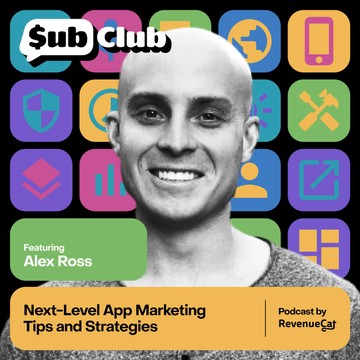
Jul 14, 2021 • 1h 8min
Next-Level App Marketing Tips and Strategies — Alex Ross, Greg
Watch the video version of this show on YouTube »Alex Ross is the co-founder & CEO at Gregarious, Inc. Gregarious is the company behind Greg, an app dedicated to helping people grow healthier and happier plants. Greg’s community has grown from 100 beta users in August 2020 to over 50,000 monthly active users today.Alex graduated from the University of California, Los Angeles, and studied data science and statistics at MIT. Alex has worked for companies such as Cisco, The Daily Aztec, and Cannon Trading.Prior to founding Gregarious, Alex spent 4 years as Director of Engineering at Tinder. Alex also co-founded Enplug, a digital signage company that was acquired earlier this year.In this episode, you’ll learn:The two critical steps in making a successful appAn ingenious strategy for partnering your app with retail companiesWhy you should involve your customers in content creationLinks & ResourcesTinderEnplugfitbod appY Combinator (YC)Alex Ross’ LinksGreg appAlex’s Twitter: @AreteRossJob opportunities at GregariousAlex’s LinkedInGregarious, Inc. on LinkedInFollow Us:David Barnard: https://twitter.com/drbarnardJacob Eiting: https://twitter.com/jeitingRevenueCat: https://twitter.com/RevenueCatSub Club: https://twitter.com/SubClubHQEpisode TranscriptAlex: 00:00:00The two steps in making a successful app business are make something worth using, and then put it in front of the people who would use it.If you have a plant, and you don’t know what to do with it, we solve that problem.So, what we did is we reached out to a bunch of plant retailers, “Hey, we will help your customers have a positive outcome with your product.”Can you put in our little QR code? And now when these retailers ship out a new plant, every single one of them has this little QR code in it.It led to our first 15,000 users, I’d say. David: 00:00:30Welcome to the Sub Club podcast. I’m your host, David Bernard. And with me as always, Jacob Eiting. Hello, Jacob.Jacob: 00:00:53Happy to be here. David: 00:00:55You sound incredibly happy.Jacob: 00:00:57It’s great. It’s a Friday, David. The sun is shining. They’re grilling a bunch of chickens in my hometown. I got nothing to complain about. It’s gonna be great.David: 00:01:05Our guest today is Alex Ross, founder and CEO at Gregarious, makers of Greg, an app to help you grow healthier and happier plants. Prior to founding Gregarious Alex spent four years as director of engineering at Tinder.Alex also co-founded Enplug, a digital signage company that was acquired earlier this year. Welcome to the podcast, Alex.Alex: 00:01:27Thank you guys. Good to see you. Thanks, David, Jacob.Jacob: 00:01:29Hi. David: 00:01:30So, I’m going to try really hard this whole podcast and not call you Greg, but I’ve made that mistake.Jacob: 00:01:36I was thinking like, I get like annoying company name questions. Sometimes. I’m like, I’m sure you get more worse than me.Alex: 00:01:43But I’m considering just legally adopting Greg as alias or something. Jacob: 00:01:48Yeah. You know, I mean, that’s a news cycle right there. A little bit of earned PR. David: 00:01:55So I wanted to ask you, so obviously, you know, director of engineering at Tinder that’s, I mean, what a rocket ship that must’ve been quite a wild ride. So, tell me a little bit about, about how you ended up at Tinder and then, you know, if you do have any fun, war stories from there, that’d be great to hear. Alex: 00:02:16Yeah, definitely. It was a rocket ship. Definitely some war stories, some wins, some losses. So, I came across Tinder and I was looking to get into like a consumer application. so I was interviewing with Uber and Twitter, and then I came across Tinder on an angel list. Actually the head of recruiting at the time reached out to me and I kind of took it on a whim.To be honest, I had not used the app before, before even interviewing or anything. that’s kind of a challenge for Tinder is like, do you, how many of the teammates need to use Tinder? Because a lot of people are married and in relationships, and those are great people to have on the team. And so it makes it odd, and kind of difficult or complicated. But, basically I joined when it was around 70 people, if I recall. So, it was a pretty small team. There was already a global user base, so it was one of the scrappiest, global brands I think probably has ever existed. Because this was all right before Tinder or right around the time that Tinder launched its first monetization efforts.And so there wasn’t really awareness as to like, great, there’s this like large, global, many millions of people are using this thing, but is it going to make money? Right? That was still an open question at the time that I joined. So, yeah, basically I joined and it was very, it was definitely still a startup.And, so there was not a lot of structure and I think my manager changed on the first day, like the person I was talking about working with's desk changed, but I had a great time and basically I ended up creating the growth team. So I became very focused on, growing the international user base.One of the coolest things that that team did is we decoupled Tinder from Facebook. And this was from Facebook login because like Tinder came to, came to fame by having, you know, you tap one button, it imports your Facebook photos. It basically made online dating as easy as it possibly can be because like you push a button you’re in and then you’re dating.Right. And by making it that simple, it made it so you felt less than desperate by using it. I think it was like one of the important psychological dynamic, because if you feel like you have to work to start using that application, then maybe it means that like you aren’t having as much success in dating in the real world.So, by making it simpler, it made it less stigmatized. More cool. Right? And so when we decided to then allow people to create accounts with a phone number that introduced all this complexity around like, well, are people going to want to do that? Then they have to add profile photos. They have to type in their name.You have to introduce an onb...
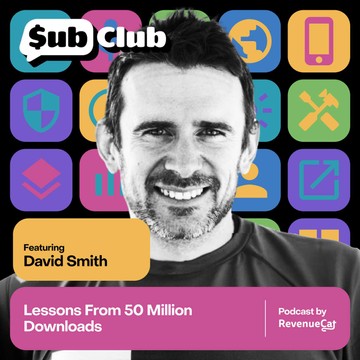
Jun 30, 2021 • 57min
Lessons Learned From 50 Million Downloads — David Smith, Widgetsmith
David Smith, a successful app developer with over 50 million downloads, shares his journey from a hobbyist to a full-time developer. He discusses mistakes to avoid when starting out, how customers find new apps in 2021, and the biggest waste of time and money for developers.
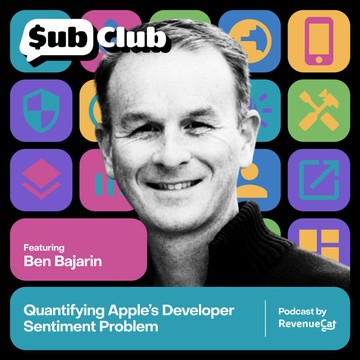
Jun 23, 2021 • 1h 6min
Quantifying Apple’s Developer Sentiment Problem — Ben Bajarin, Creative Strategies
Our guest today is Ben Bajarin, CEO and Principal Analyst at Creative Strategies. For the past 20 years, Ben has been studying the consumer tech market and providing actionable insight and strategic recommendations to many of the top technology companies in the world.In this episode, you’ll hear about:The results from Ben’s survey of iOS developersWhy positive developer sentiment is invaluable to platform ownersHow much developers think is fair for Apple to chargeFollow Us:David Barnard: https://twitter.com/drbarnardJacob Eiting: https://twitter.com/jeitingBen Bajarin: https://twitter.com/BenBajarin
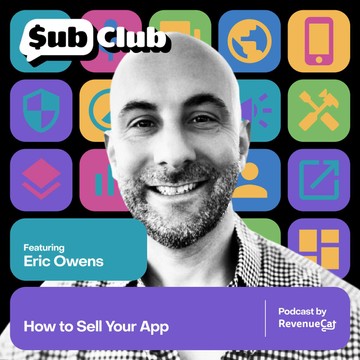
May 19, 2021 • 56min
How to Sell Your App — Eric Owens, App Business Brokers
In this episode, you’ll hear about:The pros and cons of selling an app on your own versus going through a brokerWhat to watch out for during negotiationsWhat to expect after selling your appFollow Us:David Barnard: https://twitter.com/drbarnardJacob Eiting: https://twitter.com/jeitingEric Owens: https://www.linkedin.com/in/ericowens/Here’s the Outline of Our Interview with Eric:(1:00) Eric and David have worked together before!(1:25) How Eric became an app broker.(5:09) The top reasons app developers decide to sell their businesses; capital gains taxes; David’s experience selling his first app.(8:03) Why people buy app businesses.(10:11) Do app buyers typically purchase successful apps or fixer-uppers?(13:35) The benefits of selling a successful app “prematurely;” David’s Mirror app.(15:25) The challenges of selling iOS apps: iCloud, Passbook, Sign In with Apple, Catalyst; Gas Cubby.(19:13) How app business valuations are calculated; the App Store Small Business program.(23:34) Adding subscriptions to an app increases its value to buyers.(26:51) What kind of documentation you should have in place before selling your app.(28:34) How buyers approach purchasing an app from a solo developer.(30:27) Finding app buyers.(33:33) App business sales increased during the COVID-19 pandemic.(34:00) The pros and cons of selling your app on your own; Flippa.(39:17) Going through a broker helps you stay emotionally detached during the negotiation process.(40:35) Fiduciary duties; representing app buyers versus sellers.(42:38) What to watch out for during negotiations; low-ball offers; due diligence.(48:17) The app sale closing process; escrow.com; closing costs.(50:21) Brokerage fees; working with Eric.(51:00) What comes after an app sale? Non-compete agreements; handoffs.(57:00) Connect with Eric on LinkedIn or get in touch at appbusinessbrokers.com.Quotes:“Any business with any kind of subscription revenue is always going to sell for higher, no matter what it is. Buyers love that... The one move you can make in any business that will increase your valuation is to add some kind of subscription revenue.” - Eric“As I get later in my life, [I’ve realized] brokers are amazing. Think about it: as an app developer, you spend 99% of your time being an app developer, right? And then you have this 1% critical action, which is the sale… It’s really useful to have somebody on your side who’s done this before and can tell you what you’re doing that’s wrong and what you’re doing that’s right.” - Jacob“If you’re an inexperienced seller of something, get somebody to help you out.” - Jacob“I forget what I paid Eric; it was probably $20,000 or $30,000. But to me, I saw it as worth every penny because he helped bring the market that got the highest and best value of the app… Having access to that pool of buyers and having Eric’s experience helping me walk through it, I think it made up the [cost] of whatever I paid him in the valuation that I got in the sale.” - David“I’ve sold three apps, and it’s been huge for me. It’s helped pay off debt, it’s helped put a little money away, and helped me sleep better at night. There’s a lot of reasons to do it.” - David“There’s a lot of people who can’t make [apps]. I think as indie app people, we just kind of take for granted — because we hang out on Twitter with a bunch of other people who know how to make apps — that it’s not that unique. And it’s a tough business; it’s not always easy to make an app that’s going to make you a lot of money. But if you factor in… the fact that not everybody can make these things, that can be a really useful tool for you to unlock liquidity earlier than you would otherwise.” - Jacob“I think people should have the mindset… that you are building an asset that you can sell someday if you want to. You don’t ever have to, but build something that is sellable. If people can treat it more as an investment, that can see people through some of the dark times, the challenges of being an entrepreneur.” - EricLike this episode?Subscribe to Sub Club on Spotify or Apple Podcasts to get the latest news on mobile subscription apps.
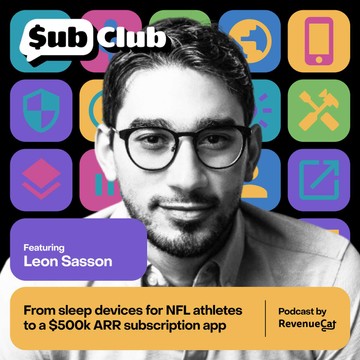
May 5, 2021 • 52min
From Sleep Devices for NFL Athletes to a $500k ARR Subscription App — Leon Sasson, Rise Science
Our guest today is Leon Sasson, Co-Founder & CTO at Rise Science, a company dedicated to helping people overcome sleep challenges, feel better, and be more productive.Since its inception in 2014, Rise has primarily focused on elite athletes, helping some of the top NFL, NBA, and college football teams with their sleep. But in 2019 they decided to enter the consumer subscription space, which became even more important in 2020 as COVID challenged their B2B model. Leon and the team at Rise went from no experience in consumer subscriptions in late 2019 to over $500k in ARR today.In this episode, you’ll hear about:The blurring line between B2B and consumer SaaSA/B testing and subscription lifestyle analysisHow to create a fantastic onboarding experience for your usersFollow Us:David Barnard: https://twitter.com/drbarnardJacob Eiting: https://twitter.com/jeitingLeon Sasson: https://twitter.com/leonsassonHere’s the Outline of Our Interview with Leon:(1:25) Leon’s background in sleep research and the founding of Rise; FitBit.(3:38) Rise started as a solution for elite athletes; the NFL; sleep hardware devices.(4:38) How the COVID-19 pandemic prompted Rise to switch to consumer subscriptions.(5:26) The difference between the B2B product and the Rise app.(7:13) Pre-launch user cohorts and test strategies; TestFlight; Typeform.(9:36) How Apple responded to the switch from B2B to consumer app; Notion; the Apple App Review process.(11:32) Selling digital services to enterprises; Salesforce.(16:01) How other products are investing in enterprise; Slack; Calm; Headspace; Kaiser Permanente.(18:08) App user licenses; Family Sharing; Business vs. Personal SaaS.(23:00) User onboarding best practices; Leon’s controversial opinion on adding friction.(32:18) A/B testing and statistical significance; user research.(39:31) Simultaneous experiments; R.(41:52) The downstream effects of A/B experiments; counter-metrics; monthly subscriptions and free trials.(47:57) Subscription lifecycle analysis; RevenueCat charts; Amplitude.(50:00) Pricing consumer apps; the freemium model.(51:56) Connect with Leon on Twitter or by email at leon@risescience.Quotes:“The most important thing you can do for your health and energy during the day is sleep.” - Leon“I would suggest to anybody who’s in that pre-launch phase, if you can get some situation … where you have a trickle of users and you can start to make decisions integrated with user feedback, that’s so much better than flying blind.” - Jacob“The activation energy of one consumer subscriber is so much lower than one enterprise deal.” - Jacob“You need to figure out who’s the person that buys your product at a company—and what do they care about and what do they need to justify the budget? And if you do, it’s great because they can pay more than consumers. And I think that’s sort of the holy grail. You can sell the same product for more expensive because they get more value [out of your product].” - Leon“There are ways to sell services outside of the App Store. It’s just generally a way worse experience for users.” - Leon“The [purpose] of onboarding is never to show people how to use the app. People don’t really want a tutorial—if you need a tutorial, it’s too complicated. They just want to know how what you’re doing and what your product is doing affects their lives and why they should care about it.” - Leon“The key for your onboarding … is that you match intent to friction. Part of the reason best practices around onboarding are to reduce friction is because people come into so many apps with so much less intent… You just have to match that.” - David“Testing is not going to make a great product. Having a really good A/B testing organization and team that can A/B test is not going to lead to the best product ever.” - Leon“You can much more easily A/B test your way into a bad product than into a good product if product isn’t the focus around the testing.” - DavidLike this episode?Subscribe to Sub Club on Spotify or Apple Podcasts to get the latest news on mobile subscription apps.


